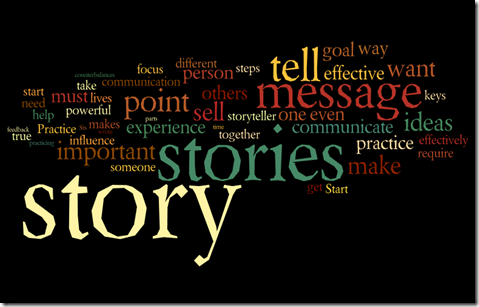My Story of the Day exercise will change your life. I promise. And you'll find a bunch of stories in the process.
/Slate editor Allison Benedikt sent the following tweet around the holidays. Julia Turner, who was referenced in the tweet (Benedikt may actually be quoting her) is Slate’s editor-in-chief:
@juliaturner "You live your life. Most days are pretty much the same. You forget most things you’ve done. Then it’s over." Happy holidays!
This tweet struck a chord for me.
For more than a year, I’ve been teaching storytelling workshops as part of Speak Up, the storytelling organization that my wife and I founded in 2013. In addition to the many things that I teach to storytellers, I spend a great deal of class time sharing strategies for generating new story ideas.
There is one exercise in particular that I love. In fact, whether you are a storyteller or not, this exercise can change your life forever. No joke.
Before I go to bed each evening, I sit down in front of my computer for five minutes and ask myself this question:
“If I had to tell a five minute story onstage about something that happened to me today, what would that be?”
Then I review my day, seeking out that one defining, possibly story-worthy moment. Oftentimes the moment is unspectacular. Hardly story worthy at all. But more often than you might think, I manage to find an actual story in my day.
It’s rarely a great story. Most of the time, it’s not even a good story. But it’s a story. Something that made this day different from the rest. Something possibly worthy of telling someday.
And sometimes, I find a great story. Something that I can’t wait to tell. More often than you might expect.
Once my story of the day has been identified, I record it in an Excel database, usually with a couple sentence fragments of description. Just enough detail to remind me of the story later on.
This is different than writing in a journal or a diary every day. Journals and diaries do not demand that you find stories. A diary or a journal entry can reflect a person’s thoughts and feelings for the day, but they do not require the purposeful search for story. They do not insist that the person seek a defining moment from every day of their lives.
It’s these defining moments that make all the difference. It’s the process of recording the stories of our lives that can change your life.
It's changed my life.
Suddenly my days are no longer “pretty much the same.” No longer do I forget most of the things that I have done. Every single day of my life now contains the kernel of a story, and about once or twice a week, those stories are good enough to move over to my official database of story ideas, which currently stands at 194 items.
194 potential stories to tell. 194 stories good enough to tell.
I have no more forgotten days.
A storyteller who I adore once asked me why he never hears me repeat a story onstage. With 194 possible stories waiting to be told and a constantly growing list, why would I ever repeat a story?
At this rate, I'll never get through the list that I already have.
Since I’ve been teaching this strategy to my students, I’ve witnessed some incredible results.
About a dozen of my students continue to do this exercise everyday. Twelve is honestly a pathetic number. I’ve probably taught more than 100 students over the past year, so my percentage of students committed to the process is low. But this process requires a commitment. It’s a five minute commitment, but for some people, even that is a lot.
More importantly, it also requires a great deal of faith.
You have to believe that the process will ultimately yield results. You have to believe that the five minutes spent each day are worth it, even after days when the best you can do are story ideas like these:
I make dinner. Hot dogs and macaroni and cheese. The only dinner I can actually make.
Taught Clara about the Rolling Stones while lying in bed with her. She likes the way Jagger dances.
Walked dog at 2:00 for the second straight night. Snowing.
These entries will probably not make good stories. If Clara turns out to be a Rolling Stones fan someday and we attend a concert together, perhaps the entry about her and the Stones will become relevant, but it’s unlikely.
But I remember each one of those moments clear as day.
I remember cooking my wife hot dogs and macaroni to surprise her after an especially hard day.
I remember lying in my five year-old daughter’s bed, listening to Satisfaction and explaining the difference between The Stones and The Beatles.
I remember the snow starting to fall as I walked around the block in my slippers, trailing my dog. It was cold and quiet, and I felt so lucky to be out there to see the first flakes, despite the hour.
Those days are not lost to me. They will never be lost to me.
The dozen or so people who continue to record their daily stories do so religiously. We have become a cult. All report that the process has changed their lives. Comments from my former students include:
“I’ve always wanted to meditate but was never able to. But this I can do. It’s like a form of focused meditation. I see so much from my day that I would’ve forgotten.”
“I’ve discovered that I have stories. I lead a more interesting life than I ever knew. I can’t believe it.”
“I feel like I’m a more important part of the world now. I feel like my story is a part of a bigger story.”
“I’ve learned so much about myself and recovered so many stories from my childhood through this process that I had forgotten.”
This is also true. By sitting down and reviewing your day, searching for a story worthy moment, the door to the past often swings open and memories long since forgotten are suddenly pour through.
Looking for stories? Follow this process every day for the rest of your life.
More importantly, do you want to change your life? Do you want your days to matter? Do you want to recall the moments of your life that mean so much in the moment but are lost so easily?
Take my advice. Commit to five minutes every day.
Alison Benedikt (or perhaps Julia Turner) was not wrong. "Most days are pretty much the same. You forget most things you’ve done. Then it’s over."
Don’t let that be you.

